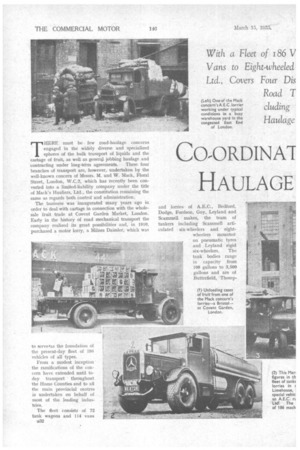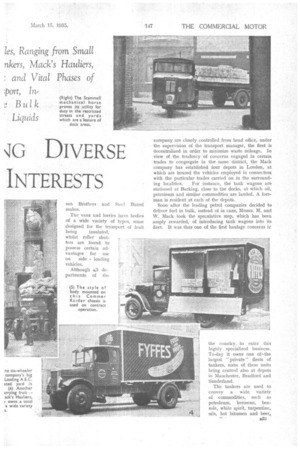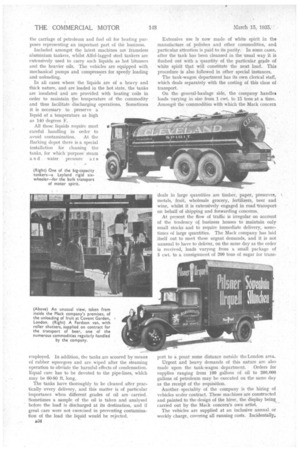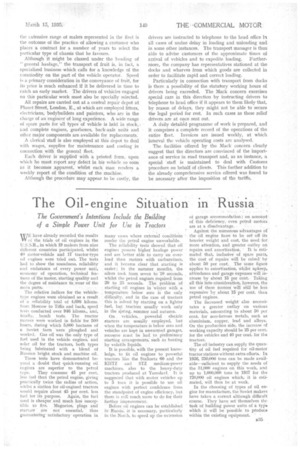CO-ORDINAT ■ IG DIVERSE HAULAGE INTERESTS
Page 46

Page 47

Page 48

Page 49

If you've noticed an error in this article please click here to report it so we can fix it.
THERE must be few road-haulage concerns engaged in the widely diverse and specialized spheres of the bulk transport of liquids and the cartage of fruit, as well as genera,1 jobbing haulage and contracting under long-term agreements. These four branches of transport are, however, undertaken by the well-known concern of Messrs. M. and W. Mack, Floral Street, London, W.C.2, which has recently been converted into a limited-liability company under the title of Mack's Hauliers, Ltd., the constitution remaining the same as regards both control and administration.
The business was inaugurated many years ago in order to deal with cartage in connection with the wholesale fruit trade at Covent Garden Market, London. Early in the history of road mechanical transport the company realized its great possibilities and, in 1910, purchased a motor lorry, a Milnes Daimler, which was to serveras the foundation of the present-day fleet of 186 vehicles of all types.
From a modest inception the ramifications of the concern have extended until today transport throughout the Home Counties and to all the main provincial centres is undertaken on behalf of most of the leading industries.
• The fleet consistsof 72 tank wagons and 114 vans -n32
and lorries of A.E.C., Bedford, Dodge, Fordson, Guy, Leyland and Scammell makes, the team of tankers including Scammell articulated six-wheelers and eightwheelers mounted on pneumatic tyres and Leyland rigid six-wheelers. The tank bodies range in capacity from 100 gallons to 3,500 gallons and are of Butterfield, Thomp son Brothers and Steel Barrel makes.
The vans and lorries have bodies of a wide variety of types, some designed for the transport of fruit being insulated, whilst roller shutters are found to possess certain advantages for use on side loading vehicles.
Although ll departments of the company are closely controlled from head office, under the supervision of the transport manager, the fleet is decentralized in order to minimize waste mileage. In view of the tendency of concerns engaged in certain trades to congregate in the same district, the Mack company has established four depots in London, at which are housed the vehicles employed in connection with the particular trades carried on in the surround ing localities. For instance, the tank wagons are stationed at Barking, close to the docks, •at which oil, petroleum and similar commodities are landed. A foreman is resident at each of the depots.
Soon after the leading petrol companies decided to deliver fuel in bulk, instead of in cans, Messrs. M. and W. Mack took the speculative step, which has been amply rewarded, of introducing tank wagons into its fleet. It was thus one of the first haulage concerns ir
the country. to enter this highly specialized business. To-day it owns one of4,the largest "private" fleets of tankers, sonic of these units being centred also at depots in Manchester, Bradford and, Sunderland.
The tankers are used to convey a wide_ variety of commodities, such as petroleum, kerosene, benzoic, white spirit, turpentine, oils, hot bitumen and beer, the carriage of petroleum and fuel oil for heating purposes representing an important part of the business.
Included amongst the latest machines are frameless aluminium tankers, whilst Alfol-lagged steel tankers are extensively used to carry such liquids as hot bitumen and the heavier oils. The vehicles are equipped with mechanical pumps and compressors for speedy loading and unloading.
In all cases where the liquids are of a heavy and thick nature, and are loaded in the hot state, the tanks are insulated and are provided with heating coils in order to maintain the temperature of the commodity and thus facilitate discharging operations. Sometimes it is necessary to preserve a liquid at a temperature as high as 140 degrees F.
All these liquids require most careful handling in order to avoid contamination. At the Barking depot there is a special installation for cleaning the tanks, for which purpose steam a n d water pressure a. r employed. In addition, the tanks are scoured by means of rubber squeegees and are wiped after the steaming operation to obviate the harmful effects of condensation. Equal care has to be devoted to the pipe-lines, which may be 60-80 ft. long.
The tanks have thoroughly to be cleaned after practically every delivery, and this matter is of particular importance when different grades of oil are carried. Sornetimes a sample of the oil is taken and analysed before the load is discharged at its destination, and if great care were not exercised in preventing contamination of the load the liquid would be rejected.
.ua4 Extensive use is now made of white spirit in the manufacture of polishes and other commodities, and particular attention is paid to its purity. In some cases, after the tank has been cleansed in the usual way it is flushed out with a quantity of the particular grade of white spirit that will constitute the next load. This procedure is also followed in other special instances.
The tank-wagon department has its own clerical staff, which deals separately with the costing of this class of transport.
On the general-haulage side, the company handles loads varying in size from 1 cwt. to 15 tons at a time. Amongst the commodities with which the Mack concern deals in large quantities are timber, paper, preserves, metals, fruit, wholesale grocery, fertilizers, beer and wine, whilst it is extensively engaged in road transport on behalf of shipping and forwarding concerns.
At present the flow of traffic is irregular on account of the tendency of business houses to maintain only small stocks and to require immediate delivery, sometimes of large quantities. The Mack company has laid itself out to meet these urgent demands, and it is not unusual to have to deliver, on the same day as the order is received, loads varying from a small package of 5 cwt. to a consignment of 200 tons of sugar for trans port to a point some distance outside the London area, Urgent and heavy demands of this nature are also made upon the tank-wagon department. Orders for supplies ranging from 100 gallons of oil to 200,00Q gallons of petroleum may be executed on the same day as the receipt of the requisition. Another speciality of the company is the hiring of vehicles under contract. These machines are constructed and painted to the design of the hirer, the display being carried out by the Mack concern's own artist.
The vehicles are supplied at an inclusive annual or weekly charge, coveting all running costs. Incidentally,
the extensive range ot makes represented in the fleet is the outcome of the practice of allowing a customer who places a contract for a number of years to select the particular type of chassis that he favours.
Although it might be classed under the heading of " general haulage," the transport of fruit is, in fact, a specialized business -which calls for a knowledge of the commodity on the part of the vehicle operator. Speed
a primary consideration in the conveyance of fruit, for its price is much enhanced if it be delivered in time to catch an early market. The drivers of vehicles engaged on this particular work must also be specially selected.
All repairs are carried out at a central repair depot at Planet Street, London, E., at which are employed fitters, electricians, barlYbuilders and painters, who are in the charge of an engineer of long experience. A wide range of spare parts for all types of vehicle is held in stock, and complete engines, gearboxes, back-axle units. and • other major components are available for replacements: A clerical 'staff is also employed at this depot to deal with wages, supplies for maintenance and costing in connection with the general Acct.
Each driVer is supplied with a printed form,upon which • he must report any defect in his vehicle so soon as it becomes apparent, whilst each' man renders a weekly report of the condition of the machine.
Although the procedure may appear to be costly, the .
drivers are instructed to telephone to the head office in all cases of undue delay in loading and unloading and in some other instances. The transport manager is thus able to advise customers of the approximate times of arrival of vehicles and to expedite loading. FurtherMore, the company has representatives stationed at the docks and wharves from which goods are collected in order to facilitate rapid and correct loading.
Particularly in connection with transport from docks is there a possibility of the statutory working hours of drivers being exceeded. The Mack concern exercises special care in this direction by instructing drivers to telephone to head office if it appears to them likely that, by reason of delays, they might not be able to secure the legal period for rest. In such cases as these relief drivers are at once sent out.
A daily detailed programme of work is prepared, and it comprises a complete record of the operations of the entire fleet. Invoices are issued weekly, at which interval the vehicle operating costs are analysed.
The facilities offered by the Mack concern clearly suggest that the directors are convinced of the importance of service in road transport and, as an instance, a special • staff is maintained to deal with Customs procedure on behalf of clients. This further addition to the already comprehensive service offered was found to be necessary after the imposition of the tariffs.




























































































